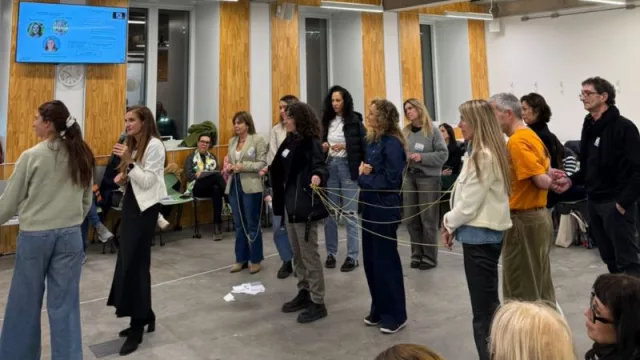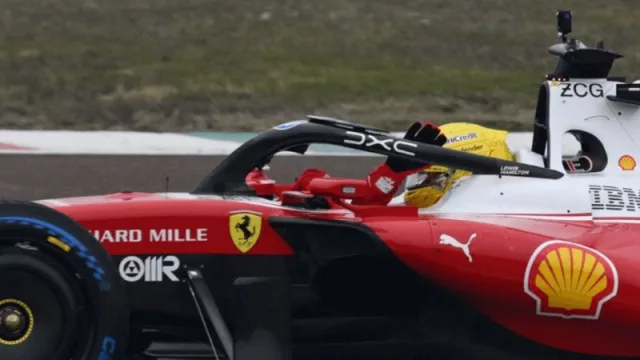Hosted at the prestigious University Torcuato Di Tella in Buenos Aires, this milestone marks an evolution in management and modern society.
What is Systemic Wisdom?
Definition:
A leadership approach that integrates systems thinking, adaptive leadership, relational intelligence, and ethical reflection to manage complex organizations. It focuses on system-level interventions, not just individual behavior, aiming to develop capacities for learning, resilience, and sustained collaboration.
Insights from Beatriz Catalá and Alejandra Álvarez:
"Systemic Wisdom is not just a course; it’s an experiential learning journey."
-
Its aim is to teach you to see differently— to understand the systems we inhabit.
To grasp these systems, you will train in how we coexist within them and learn how to influence them. You’ll work on shifting your perspective, your leadership style, and how you inhabit relationships—using real tools—sharing this process with a community that’s on the same quest and in the same journey.
Systemic leadership, therefore, abandons power over others and is rooted in the power of “co,” enabling leaders to convene, facilitate, and catalyze collective intelligence. A leader is part of the system they seek to influence; to do so, they must transform themselves first.
Recent Evolution:
In recent years, Systemic Wisdom has translated into executive training programs that combine various thought currents with modern practices (agility, mindfulness, ethics, diversity, and inclusion) for corporate, public, and sports contexts.
Why is it so successful? (Key factors)
-
Addresses real complexity: Today, organizations operate in VUCA environments (Volatility, Uncertainty, Complexity, Ambiguity). The systemic approach offers tools to understand root causes and side effects.
-
Enhances decision-making: By considering multiple actors, flows, and incentives, it reduces impulsive decisions and improves solution quality
-
Fosters resilience and adaptability: Promotes continuous learning, controlled experimentation, and quick adjustments to change.
-
Aligns communities of interest: Integrates multifunctional teams, stakeholders, communities, and media, strengthening governance and cultural cohesion.
-
Elevates leadership at multiple levels: Works for C-suite leaders and team managers alike, enabling effective interventions across organizational layers.
-
Practical and measurable: Uses system maps, scenarios, group dynamics, and metrics of learning and performance to demonstrate tangible impact.
Core Principles and Typical Components
-
Systems Thinking: Understanding interdependencies, feedback loops, and long-term effects.
-
Adaptive Leadership: Provoking necessary change in complex problems; managing resistance and risks.
-
Relational Intelligence: Managing networks, team dynamics, trust, and effective communication with multiple stakeholders.
-
Organizational Learning: Cultivating cultures of experimentation, reflection, and continuous improvement.
-
Ethics and Sustainability: Making decisions with social, environmental, and reputational impact.
-
Mindfulness and Resilience: Presence, mental clarity, and stress management to lead with purpose.
Tools and Practices:
-
System Mapping: Causal loops, value flow diagrams, stakeholder maps.
-
Scenarios and Simulations: Exploring future possibilities and testing responses pre-emptively.
-
Group Dynamics: Co-creation workshops, active listening dialogues, shared decision-making.
-
Change Management: Strategies for gradual implementation and learning by doing.
-
Learning Metrics: Collaboration indicators, learning speed, strategic alignment, and sustainable results.
If you sense that your way of seeing the world is shifting, perhaps it’s time to shape that new phase. Join us in System Wilson, a new way of looking.
The Revolution in Management, Thinking, and Society for a New Business Era
-
The answer is not just resource management but co-creating living systems that evolve with wisdom and consciousness.
-
The opportunity is to adopt systemic leadership—a paradigm that integrates self-awareness, empathy, and deep understanding of the environment. This pioneering training in Latin America, at one of the most innovative universities in the region, is a call to that transformation.
Watch the video:
https://www.instagram.com/reel/DM_NCzcuaKV/?utm_source=ig_web_copy_link&igsh=MWZzM2oxamg1dHpseg==
Are you ready to take this step?
The leadership revolution starts now.
Next edition: August 26
Last spots available
Contact: [email protected]
Location: Universidad Torcuato Di Tella (In-person - Hybrid)
Alejandra Álvarez’s mobile: +54 9 3512 32-1308
IG: https://www.instagram.com/alealvarezcoaching?igsh=MWg0NXF2YWtiYnF1aw==
Learn more about the training here:
Systemic Wisdom (The Origins of Systemic Leadership)
Conceptual Roots:
-
Systems Thinking: Ludwig von Bertalanffy’s framework, popularized in organizations, understanding interconnections and feedback effects.
-
Learning Organizations: Peter Senge’s The Fifth Discipline (1990) promoted the idea of governments and teams that learn continuously through mastering systems, mental models, and shared vision.
-
Adaptive Leadership: Heifetz and Linsky (The Practice of Adaptive Leadership, 1990s–2000s) highlight difficult change with simple techniques and solutions.
-
Leadership in Complexity: Complexity Leadership Theory (Uhl-Bien, Marion & McKelvey, 2007–2009) explains how innovation and execution emerge from the interaction between structures and agents in complex systems.
Recommended readings from Infonegocios Miami to deepen this vital knowledge:
-
The Fifth Discipline (Peter Senge) – Foundations of systems thinking and learning organizations.
-
The Practice of Adaptive Leadership (Heifetz, Linsky, Grashow) – Leading through complex change.
-
Complexity Leadership Theory (Uhl-Bien, Marion, McKelvey) – How innovation and execution happen in complex systems.
Additional readings on ethics, neuroscience applied to leadership, crisis management in complex environments, and current articles on systemic leadership in business, public, and sports contexts complete this essential body of knowledge.
Subscribe to Infonegocios.Miami for more analysis where sports, science, and business collide.
Read Smart, Be Smarter!
Infonegocios NETWORK: 4.5 million Anglo-Latinos united by a passion for business.
Join us and stay informed:
Subscribe for free
Contact Infonegocios MIAMI:
-
marcelo.maurizio@gmail.com












Tu opinión enriquece este artículo: